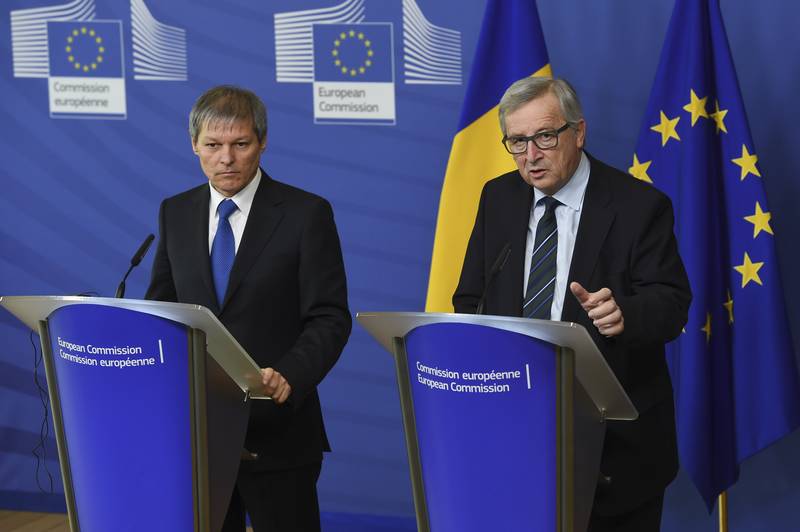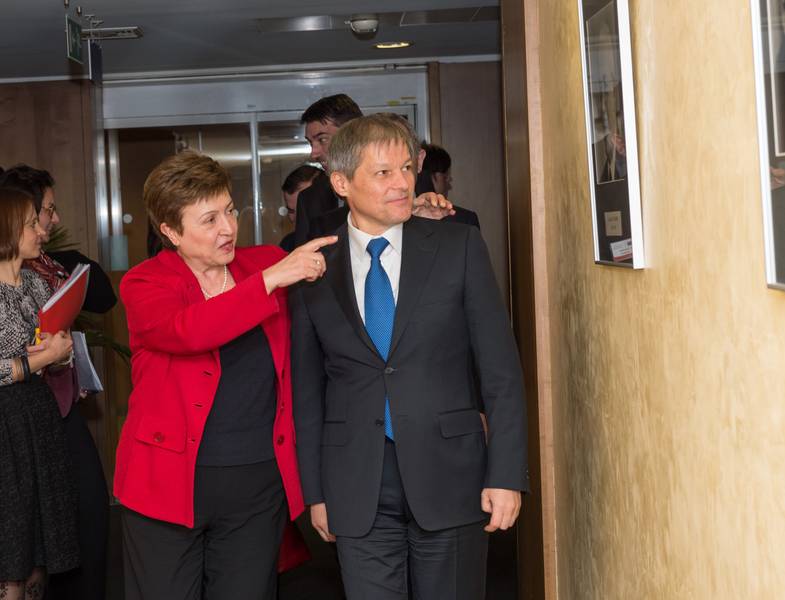Juncker, Romania, and the CVM Walk into a Bar...
Adelina Marini, February 17, 2016
 One statement of EC president Jean-Claude Juncker (Luxembourg, EPP) ruffled some feathers and further inflamed the already hot political atmosphere in Bulgaria. Following his meeting with Romanian Prime Minister Dacian Cioloș in Brussels Mr Juncker stated in front of journalists that Bulgaria and Romania were not tied together on their way towards the lifting of the Cooperation and Verification Mechanism (CVM), with which the two states joined the EU back in 2007, because they had not fulfilled all requirements regarding the judicial reform in the way of independence and accountability, fighting corruption in the high levels of power, and in Bulgaria’s case regarding the battle with organised crime as well. He reiterated his position, which he has been following since he took the presidency, that the mechanism will be lifted by the end of his term in the year 2019.
One statement of EC president Jean-Claude Juncker (Luxembourg, EPP) ruffled some feathers and further inflamed the already hot political atmosphere in Bulgaria. Following his meeting with Romanian Prime Minister Dacian Cioloș in Brussels Mr Juncker stated in front of journalists that Bulgaria and Romania were not tied together on their way towards the lifting of the Cooperation and Verification Mechanism (CVM), with which the two states joined the EU back in 2007, because they had not fulfilled all requirements regarding the judicial reform in the way of independence and accountability, fighting corruption in the high levels of power, and in Bulgaria’s case regarding the battle with organised crime as well. He reiterated his position, which he has been following since he took the presidency, that the mechanism will be lifted by the end of his term in the year 2019.
For the first time he made this commitment during a geopolitically important meeting with the Bulgarian PM Boyko Borissov in December 2014. At the time, both of them had just taken office – Boyko Borissov heading the Bulgarian government for the second time, and Juncker for the first time at the head of the EC, but with long experience as Eurogroup boss, as a PM of Luxembourg and in this capacity an integral part of the Council of the EU. Neither back then, nor on Monday evening did Jean-Claude Juncker present any conditions or explanations exactly how the CVM will be lifted, but the statement that if Romania deals with things quicker than “our Bulgarian friends”, the mechanism will be lifted for it earlier, caused a storm of reactions in Bulgaria, which has for weeks now been shaking from corruption and judicial scandals, which the spirit of the CVM cannot even comprehend.
According to some, Juncker’s statement was a clear sign for removing trust from Mr Borissov, while others feel the EC president said nothing new and of consequence, so there is actually no news. This is not true, however. There is news and it is of paramount importance to something that has been in the centre of European politics for months now – the Schengen security space, of which the two states are not members yet, exactly due to their results on the CVM. In 2012, when the EC made its first summary of the work of the mechanism over the first five years of its functioning, The Netherlands and Finland blocked Romania's and Bulgaria’s accession to Schengen, because they thought the two were not ready, despite the EC and the EP repeated statements that the two countries fulfil the technical requirements. According to the Netherlands, however, the lack of progress on the fulfilment of CVM benchmarks is a valid enough argument for stopping their membership. The Netherlands stated it would need a minimum of two positive reports (this means stating progress) to lift its veto.
In 2013, Germany and France joined the Dutch resistance, even Poland expressed reluctance. In an interview for the German weekly magazine Der Spiegel the German Federal Minister of the Interior at the time Hans-Peter Friedrich threatened that if Romania and Bulgaria continued to insist the Council voted on their membership in Schengen, Germany was going to veto it. He said this in the eve of the meeting of the ministers of Justice and Home Affairs of the EU on March 7th 2013. Mr Friedrich’s threat led to the withdrawing of the Romanian request for voting and the president at the time, Traian Băsescu, stated that Romania would sacrifice whatever is necessary to enter Schengen, “even sacrificing the country’s corrupted people”.
Since then, the subject of the two states' membership in Schengen has been reviewed only once – during the Justice and Home Affairs Council in December of 2014. In the ministers’ conclusions at the time it said that the decision for full application of Schengen legislation to Bulgaria and Romania had not yet been made. Deputy PM Meglena Kuneva made several attempts at raising the issue in the Council, but it never appeared in the agenda.
Following the political crisis of 2012 and the extremely sharp extraordinary report of the EC the situation in Romania started to change dramatically. As a result one could say there have already been two positive reports, the latest one of this January being the most inspiring.
Why is Juncker’s statement important?
Just as in 2012, when with its reports the EC forced change, his statement of the late afternoon of February 15 in Brussels made with his opening words, not as a reply to a question on the subject, could serve as an extra catalyst to the changes in our Northern neighbour. Why? Because the conclusions in the report of this year, although deserving Bulgaria’s envy, have hidden pitfalls in them. The main message of the document is that good results need to turn into an irreversible process. The problem in Romania is that the country has all the necessary institutions and capacity for fighting corruption, but Parliament continues to hinder the battle against corruption at the high levels of power. This means that for the mechanism to be lifted, Romania will have to prove that the political class is no longer an obstacle to fighting corruption.
A slap to Sofia, a caress to Bucharest

What the attitudes in The Netherlands, which is currently presiding the Council of the EU and its main priority is the rule of law, are remains to be seen when the reports on Bulgaria and Romania are reviewed in the General Affairs Council. A possible separation of Romania from Bulgaria would have a highly motivating effect for both states, as this website repeatedly stated. It will serve as a catalyst to Romania, and to Bulgaria it could mean touching rock bottom and finally starting the pushing off of it, if the political will for it is found. So, we definitely do have some news and it is that the boss of the EC for the first time made it clear that the two states do not go as a bundle. Formally, there has never been any binding between the two states. Their joining is a result of political pressure. Their separation is also a matter of a political statement. This is exactly what Jean-Claude Juncker did on Monday.
Translated by Stanimir Stoev
 Entrance to the Berlaymont building | © EC - Audiovisual Service
Entrance to the Berlaymont building | © EC - Audiovisual Service | © European Union 2020, EC - Audiovisual Service
| © European Union 2020, EC - Audiovisual Service Commission President Ursula von der Leyen | © European Union 2019 - Source: EP
Commission President Ursula von der Leyen | © European Union 2019 - Source: EP